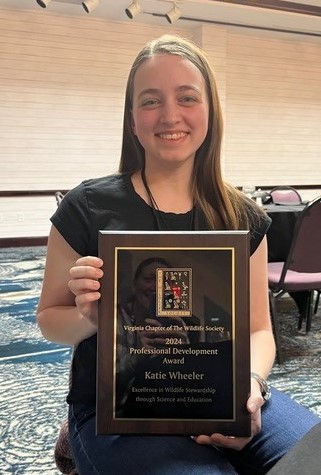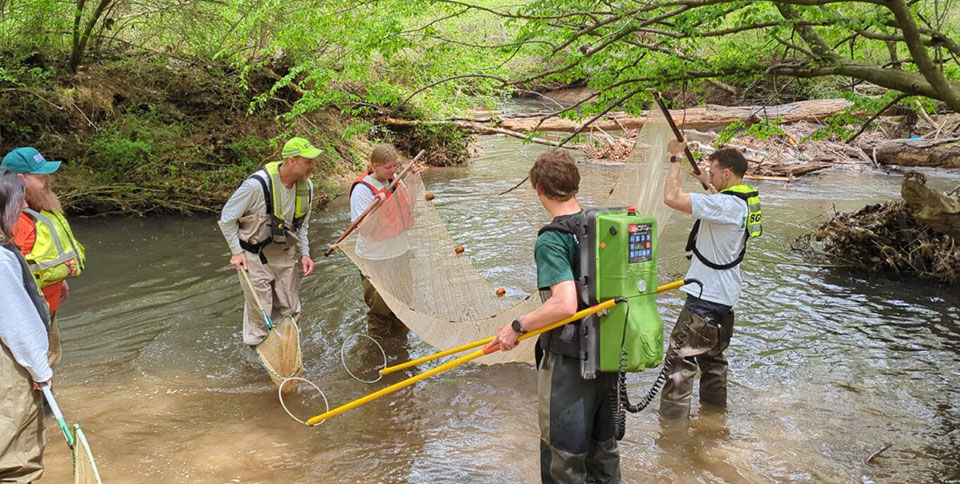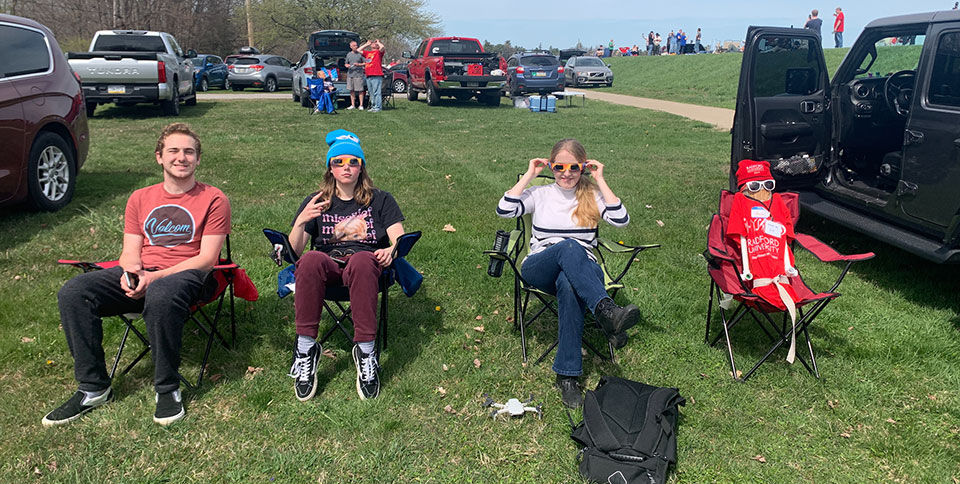Highlander Highlights: Week of April 15, 2024
Every two weeks, Highlander Highlights shares with readers some of the extraordinary research and accomplishments happening on and off campus through the tireless work and curiosity of our students and faculty.
Biology major investigates microplastic exposure in Virginia wildlife

Katie Wheeler has devoted much of her research time and efforts at Radford University to small particles – microplastics, to be specific – but her work is making an enormous impact in the community.
Much of the research on microplastics through the years “has focused primarily on marine environments,” the senior biology major explained, “but my projects have explored MP pollution in terrestrial environments here in Virginia and in Argentina.”
Radford has given Wheeler numerous opportunities to explore microplastic pollution, which the Roanoke, Virginia, native explained “originates from various sources, including the breakdown of larger plastic pollutants from consumer waste, small plastic particles from cosmetics and industrial plastics of various sizes.”
In December 2022, Wheeler assisted Radford biology faculty and the director of the Southwest Virginia Wildlife Center of Roanoke on a multi-part research project that investigated an unusual number of robin deaths on campus. “I assisted on the microplastics portion,” Wheeler said, “by helping dissect approximately 80 American robins to collect tissue samples.”
In the summer of 2023, Wheeler began her own research project, exploring microplastic exposure in Virginia terrestrial wildlife. Through a collaboration with the Southwest Virginia Wildlife Center, Wheeler dissected and collected tissue samples from approximately 80 mammal, reptile, amphibian and bird carcasses.
“I have been able to put the wildlife carcasses to good use,” she said, “by creating a database listing the county and/or city in Virginia each individual originated from and the amount of microplastics present in their tissue samples.”
Months later, in December 2023, Wheeler traveled to Argentina with Professor of Biology Sara O’Brien to assist with field research exploring microplastic pollution and exposure in Magellanic penguins across three colonies. They collected 299 fecal and soil samples, Wheeler said, giving them an opportunity to explore microplastic type and abundance in both adult penguins and chicks.
“Through all of these opportunities, the faculty in the biology department at Radford have been so supportive, whether I have worked alongside them or heard from them about my work through other sources,” Wheeler said. “As my mentor, Dr. O’Brien has opened up so many opportunities for me that I never knew existed and has encouraged me to grow as a researcher.”
Wheeler’s work is supported by a number of grants she has applied for and received, such as Radford’s Summer Undergraduate Research Fellowships (SURF) grant. She also won a $1,000 Biology Research Award through the university, as well as the 2024 Virginia Chapter of The Wildlife Society Professional Development Award and the 2024 Conservation Grant from The Virginia Society of Ornithology. The grants, Wheeler noted, will help her continue her work and travel to Connecticut’s Fairfield University this summer to work with a specialized RTIR microscope to analyze some of my microplastics samples.
Field trip participants collect and analyze water data
Assistant Professor of Geospatial Science Naveen Joseph gave students enrolled in his water resources course a unique hands-on learning opportunity recently, taking a group of six to the U.S. Geological Survey (USGS) field station in Raleigh, North Carolina.
While interacting with and learning from USGS staff, Radford students sharpened their field and research skills through “water quality sampling, sample processing, discharge measurements and ecological sampling,” Joseph explained.
Joseph, along with Professor of Geospatial Science Stockton Maxwell, designed the trip to give students a chance to take the knowledge they gained in class and apply it to a real-world environment. “There is an immense potential for projects that can emanate from collecting water data and analyzing human health impacts,” said Joseph, who said he plans to continue to offer field opportunities to students in places where they “collect datasets and analyze for various parameters.”

Students gained immeasurable benefits from the experience, such as learning about the day-to-day work at the USGS field station, said Annelise Britton, a junior geospatial science major from Floyd County, Virginia, and “understanding safe research conditions and trying new research methods.”
Learning about water-quality sampling with the USGS “was such an amazing learning experience,” said junior geospatial science major Nina Becksted of Virginia Beach, Virginia. “The sampling collection was super hands-on, and the staff was very informative.”
Britton’s main takeaway from the trip “was the strong engagement of my peers and their willingness to learn new things,” she said. “The water sampling and research we did was not only interactive but fun, too. Everyone had a smile on their face the entire day, even after we got soaked from a storm that rolled in!”
Radford a ‘welcoming place’ for ASCLS-Virginia annual meeting
Radford University hosted the annual meeting of the American Society for Clinical Laboratory Science (ASCLS)-Virginia April 5-6.
More than 9,000 clinical laboratory professionals, students and educators from more than 50 state and regional societies make up the organization’s national membership roll. The Virginia conference, held in Radford’s Center for the Sciences, offered engaging educational sessions related to the profession. A blood parasite overview and a student-focused immunohematology review were among the sessions.
First Lady Kay Danilowicz gave the meeting’s opening keynote, speaking about the benefits of therapy animal programs and how such programs are applicable to educational and workplace settings. She also spoke about how therapy animals can improve wellness and enhance feelings of belonging.
Therapy dogs from Radford University’s Tartan Tails program were on-site, giving conference attendees a chance to witness those benefits for themselves.
Opening night on Friday featured a student quiz bowl, paint night, social time and tours of the university’s greenhouse and Museum of the Earth Sciences, as well as planetarium shows.
“What a welcoming place,” ASCLS President Barbara Kraj said of Radford University’s hospitality following the conference.
They said it
While the university community gathered outside the Center for the Sciences on April 8 to catch a glimpse of the solar eclipse, a group of Radford Society of Physics Students (SPS) members trekked to Norwalk, Ohio, to witness eclipse totality. SPS president and physics major Kaleb Martin traveled with the group and later described the moment when the moon completely blocked the sun as “breathtaking.”
“Waiting for totality felt like counting down to midnight for New Year’s, but it felt extremely different when totality reached us,” said the senior from Newport News, Virginia, whose concentration is in astronomy. “I, along with countless others, were lost for words, and the only form of expression was cheerful screams. This is a very unique experience that I wish everyone in the world gets to feel at least once in their life. This is one of those feelings that you can't get from a picture or a video. If you want to experience this surreal, breathtaking experience, I urge you to go eclipse chasing.”

From left are SPS members Michael Ziegenfus, Em Stipes and Lily Backus along with Natural Log, the organization’s official mascot.